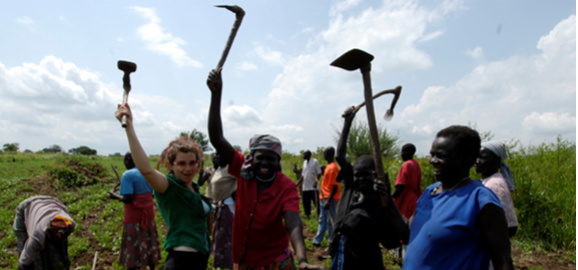This story was originally published by the Faculty of Arts.
By Mary Leong, Arts Undergraduate
UBC Anthropology PhD student Lara Rosenoff is one of this year’s winners of the Trudeau Scholarship, one of Canada’s most prestigious scholarships for social sciences and humanities graduate students.
Rosenoff’s current project, “Do Not Uproot the Pumpkin Fruit”, examines the process of post-conflict reconstruction in Northern Uganda. She aims to tell the story of how the residents of one Northern Ugandan village are rebuilding their lives through everyday social practices and transmission of inter-generational knowledge, far away from more formal transitional justice legal processes such as the International Criminal Court.
Rosenoff’s interest in Uganda was first sparked in 2004 when she was invited to work as a consultant on Uganda Rising, a film that traces the conflict in Uganda and places it in historical context.
While doing research, Rosenoff learned of the children who were abducted and forced into the rebel army as child soldiers, and the millions of people who were displaced from their communities and placed into squalid Internally Displaced Persons (IDP) camps.
“My grandmother survived the Holocaust, so the image of the camps is a very potent one for me,” said Rosenoff. “As I was reading these stories and reports I was really reminded of her stories of survival, and of the responsibility that once I knew about this, I had to do something.”
Since the production of Uganda Rising, Rosenoff has returned five more times to work on various projects.
In 2007, after the ceasefire, Rosenoff obtained permission to stay in Padibe IDP camp in Lamwo District for an extended period of time. There, she met Beatrice, an orphaned fifteen-year-old girl who was abducted by the rebel army and escaped in 2005.
Rosenoff visited Beatrice three times from 2007 to 2008, living in the camp and gaining a very real perspective of what daily life was like for residents of the camp. During that time, she worked on telling Beatrice’s story in a photo essay called “Her Name Is Beatrice, My Name Is Lara”.
“I really began to think about how we perceive conflict and how we can tell a better or different story to evoke change,” said Rosenoff. “I thought it would be interesting to break down barriers about how we perceive ‘victims’ in war by following one person and showing their everyday survival strategies.”
Her interaction with Beatrice also shaped the basis for “Do Not Uproot the Pumpkin Fruit”.
“Beatrice expressed that she felt like she was missing out on being a ‘good Acholi woman’, or knowing how to do so,” said Rosenoff. “It struck me that there was some moral or cultural education that had been disrupted by the war, or by living in the IDP camps instead of at their homes, in ‘traditional’ subsistence farming.”
Rosenoff will return to Uganda next February for eight months to finish her fieldwork for “Do Not Uproot the Pumpkin Fruit”. Subsequently, she hopes to also use the funds from the Trudeau Scholarship to bring community members to Canada to participate in talks and exhibitions.
“The scholarship not only connects me with other people across Canada, but it also helps connects me to the community I’m working with,” said Rosenoff. “It then connects these communities to other people such as policymakers in Canada. I’m really excited about that part of the scholarship.”
To learn more about Lara Rosenoff’s work, check out her website here.

